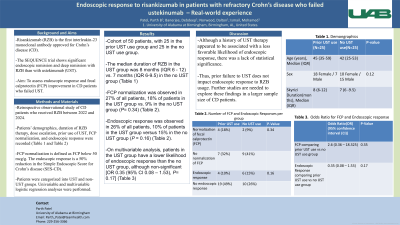Sunday Poster Session
Category: IBD
P0967 - Endoscopic Response to Risankizumab in Patients With Refractory Crohn’s Disease who Failed Ustekinumab - Real-World Experience
Sunday, October 27, 2024
3:30 PM - 7:00 PM ET
Location: Exhibit Hall E

Has Audio
- PP
Parth B. Patel, MD
University of Alabama at Birmingham
Vestavia Hills, AL
Presenting Author(s)
Parth B. Patel, MD1, Debdeep Banerjee, MD2, Dalton A.. Norwood, MD3, Mohamed Ismail, MD, MSc2
1University of Alabama at Birmingham, Vestavia Hills, AL; 2University of Alabama at Birmingham, Birmingham, AL; 3UAB Minority Health & Health Equity Research Center, The University of Alabama at Birmingham Heersink School of Medicine, Birmingham, AL
Introduction: Risankizumab (RZB) is the first interleukin-23 monoclonal antibody to be approved for moderate to severe Crohn’s disease (CD). The SEQUENCE trial demonstrated greater endoscopic remission, mucosal healing, and deep remission with RZB than with ustekinumab (UST). Little is known if prior UST failure impacts endoscopic response to RZB usage. We aimed to assess endoscopic response in CD patients who failed UST.
Methods: This is a retrospective observational study of CD patients with complete clinical data who received RZB between 2022 and 2024. Patients’ demographics, clinical characteristics, and outcomes were recorded, including duration of RZB therapy, dose escalation, prior use of UST, FCP normalization and endoscopic response. FCP normalization was defined as FCP below 50 mcg/g. Endoscopic response was defined as 50% reduction in the Simple Endoscopic Score for Crohn’s disease (SES-CD). Patients were categorized according to prior UST use into UST and non-UST groups. Univariable and multivariable logistic regression analysis were performed to assess factors predictive of endoscopic response.
Results: Our cohort comprised 50 patients, 50% of whom had previously received and failed UST. Patients in the UST group were on RZB for a median duration of 8 months (IQR 6 - 12) vs 7 months (IQR 6-9.5) in the non-UST group Overall, FCP normalization was observed in 27% of all patients, 18% of patients in the UST group vs 9%in the non-UST group (P = 0.34). Overall, endoscopic response was observed in 26% of all patients, 10% of patients in the UST group versus 15% in the non-UST group (P = 0.16). On multivariable analysis after adjusting for age, gender and RZB duration, patients in the UST group have lower likelihood of endoscopic response than non-UST group, although non-significant [OR 0.35 (95% CI 0.08 - 1.53), P = 0.17].
Discussion: Prior failure to UST does not impact endoscopic response to RZB usage. Further studies are needed to explore these findings in a larger sample size of CD patients.
Note: The table for this abstract can be viewed in the ePoster Gallery section of the ACG 2024 ePoster Site or in The American Journal of Gastroenterology's abstract supplement issue, both of which will be available starting October 27, 2024.
Disclosures:
Parth B. Patel, MD1, Debdeep Banerjee, MD2, Dalton A.. Norwood, MD3, Mohamed Ismail, MD, MSc2. P0967 - Endoscopic Response to Risankizumab in Patients With Refractory Crohn’s Disease who Failed Ustekinumab - Real-World Experience, ACG 2024 Annual Scientific Meeting Abstracts. Philadelphia, PA: American College of Gastroenterology.
1University of Alabama at Birmingham, Vestavia Hills, AL; 2University of Alabama at Birmingham, Birmingham, AL; 3UAB Minority Health & Health Equity Research Center, The University of Alabama at Birmingham Heersink School of Medicine, Birmingham, AL
Introduction: Risankizumab (RZB) is the first interleukin-23 monoclonal antibody to be approved for moderate to severe Crohn’s disease (CD). The SEQUENCE trial demonstrated greater endoscopic remission, mucosal healing, and deep remission with RZB than with ustekinumab (UST). Little is known if prior UST failure impacts endoscopic response to RZB usage. We aimed to assess endoscopic response in CD patients who failed UST.
Methods: This is a retrospective observational study of CD patients with complete clinical data who received RZB between 2022 and 2024. Patients’ demographics, clinical characteristics, and outcomes were recorded, including duration of RZB therapy, dose escalation, prior use of UST, FCP normalization and endoscopic response. FCP normalization was defined as FCP below 50 mcg/g. Endoscopic response was defined as 50% reduction in the Simple Endoscopic Score for Crohn’s disease (SES-CD). Patients were categorized according to prior UST use into UST and non-UST groups. Univariable and multivariable logistic regression analysis were performed to assess factors predictive of endoscopic response.
Results: Our cohort comprised 50 patients, 50% of whom had previously received and failed UST. Patients in the UST group were on RZB for a median duration of 8 months (IQR 6 - 12) vs 7 months (IQR 6-9.5) in the non-UST group Overall, FCP normalization was observed in 27% of all patients, 18% of patients in the UST group vs 9%in the non-UST group (P = 0.34). Overall, endoscopic response was observed in 26% of all patients, 10% of patients in the UST group versus 15% in the non-UST group (P = 0.16). On multivariable analysis after adjusting for age, gender and RZB duration, patients in the UST group have lower likelihood of endoscopic response than non-UST group, although non-significant [OR 0.35 (95% CI 0.08 - 1.53), P = 0.17].
Discussion: Prior failure to UST does not impact endoscopic response to RZB usage. Further studies are needed to explore these findings in a larger sample size of CD patients.
Note: The table for this abstract can be viewed in the ePoster Gallery section of the ACG 2024 ePoster Site or in The American Journal of Gastroenterology's abstract supplement issue, both of which will be available starting October 27, 2024.
Disclosures:
Parth Patel indicated no relevant financial relationships.
Debdeep Banerjee indicated no relevant financial relationships.
Dalton Norwood indicated no relevant financial relationships.
Mohamed Ismail indicated no relevant financial relationships.
Parth B. Patel, MD1, Debdeep Banerjee, MD2, Dalton A.. Norwood, MD3, Mohamed Ismail, MD, MSc2. P0967 - Endoscopic Response to Risankizumab in Patients With Refractory Crohn’s Disease who Failed Ustekinumab - Real-World Experience, ACG 2024 Annual Scientific Meeting Abstracts. Philadelphia, PA: American College of Gastroenterology.
